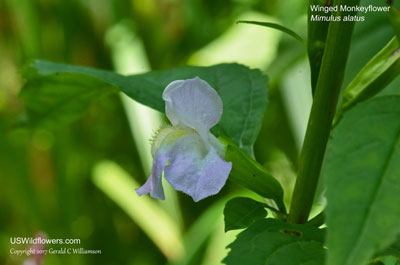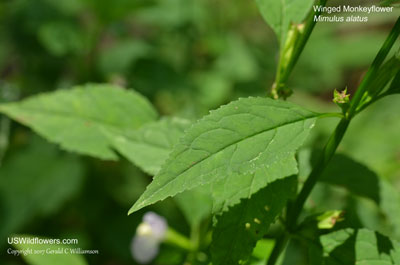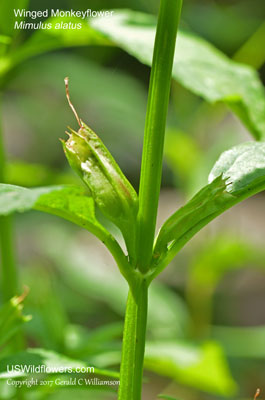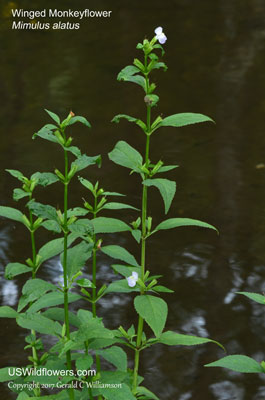Sharpwing Monkey Flower, Winged Monkeyflower - Mimulus alatus
|
Mimulus alatus - Sharpwing Monkey Flower, Winged Monkeyflower.
Phrymaceae was formerly considered monotypic - a single species in the family. However within the past 10 years, based on research by Beardsley & Olmstead (2002) recommending the dismantling of Scrophulariaceae, Mimulus and several other genera were placed in Phrymaceae, making it a small plant family with around 200 species (compare to Asteraceae with over 22,000.)
Until recently Mimulus was considered a large genus with around 150 species, including at least one found in every state in the U.S. except for Hawaii. However, a 2012 study resulted in a reclassification which now seems to have been generally accepted, and all but 7 of those species have been moved elsewhere (including others still listed in Mimulus on this website.) Most were moved into the Erythranthe genus.
Mimulus alatus is among those 7 species remaining in Mimulus, one of only two found in North America (A. ringens is the other), both of which are found only in the eastern half of the continent. All of the many western Monkeyflowers have been moved to other genera.
Found in:
AL, AR, CT, DC, DE, FL, GA, IA, IL, IN, KS, KY, LA, MA, MD, MI, MO, MS, NC, NE, NJ, NY, OH, OK, PA, SC, TN, TX, VA, WV
Leave comments on Mimulus alatus at this link. | 
Distribution of Mimulus alatus in the United States and Canada:

Blue=Native; Grey=Introduced
Map from USDA Plants Database:
USDA, NRCS. 2017. The PLANTS Database (http://plants.usda.gov, 08 May 2025). National Plant Data Team, Greensboro, NC 27401-4901 USA.
Search Our Database: Enter any portion of the Scientific, Common Name, or both.
Do a general Google search of the entire site:
#ad
 Follow USWildflowers on Twitter
#ad
| | Site: Bald River Road, Monroe County, TN Date: 2017-August-23 | Photographer: Gerald C. Williamson
Nikon D7000
Tamron SP 90MM f/2.8 AF Macro | | The flower of Mimulus alatus is usually pink, but there are reports that they are occasionally a pale blue-violet or entirely white. The throat and surrounding area is white marked with yellow. The rest of the surface of the flower may also have hairs. The corolla is two-lipped, with the upper lip consisting of a pair of erect lobes that fold back toward the calyx. The lower lip is three lobed with two ridges containing the usually-bearded yellow nectar guides. | | 
| | Site: Bald River Road, Monroe County, TN Date: 2017-August-23 | Photographer: Gerald C Williamson
Nikon D7000 | | The flowers of Mimulus alatus are about an inch long on a pedicel which is shorter than the calyx. The pedicels of similar Mimulus ringens are longer than the calyx. | | Click on the photo for a larger image

| | Site: Bald River Road, Monroe County, TN Date: 2017-August-23 | Photographer: Gerald C Williamson
Nikon D7000 | | The leaves of Mimulus alatus are opposite and held on petioles that are slightly winged (the upper leaves may be nearly sessile.) The leaves are up to 5 inches long, and are lanceolate to ovate with toothed margins. The flowers are in the axils of the leaves; a calyx of a past bloom here. | | Click on the photo for a larger image

| | Site: Bald River Road, Monroe County, TN Date: 2017-August-23 | Photographer: Gerald C Williamson
Nikon D7000 | | The stem of Sharpwing Monkeyflower is square and somewhat winged. | | Click on the photo for a larger image

| | Site: Bald River Road, Monroe County, TN Date: 2017-August-23 | Photographer: Gerald C Williamson
Nikon D7000 | | Sharpwing Monkeyflower grows in wet areas to about 3 feet tall. While the plant will produce a number of flowers, only a few are typically in bloom at the same time. | | Click on the photo for a larger image

|
References used for identification and information:
|
|
| |
| #ad
|
|







